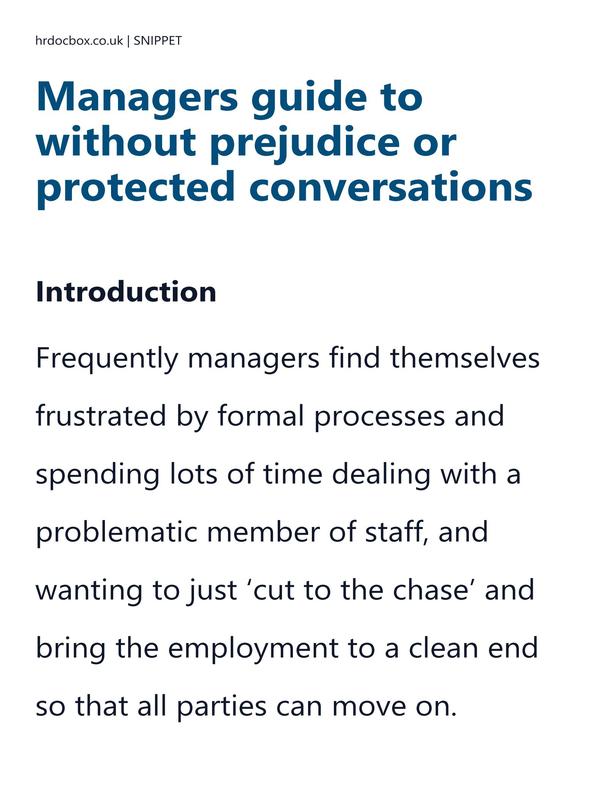Managers guide to without prejudice or protected conversations


Our Guide to without prejudiice or Protected Conversations provides comprehensive insights on handling confidential discussions, ensuring legal compliance and effective communication.
Use this model guide to assist you to hold an off-the-record conversation with an employee. Employers and employees may get to a point where ‘the writing is on the wall’ and it often suits both sides to have a frank discussion over what it would take to amicably bring the relationship to an end.
- Includes 12 months' access to the Managers guide to without prejudice or protected conversations, with all updates provided free of charge and notified to you.
- UK-specific accuracy.
- 1,588 words over 4 pages.
- Last updated 03/11/2023.
- Format: Word / PDF / plain text / email.
- Delivery: Instant download after purchase (no physical item).
- Access: Download link shown here after checkout.
- This Managers guide to without prejudice or protected conversations will SAVE you up to 2 hours research, save you money, and reduce your risk.
Managers guide to without prejudice or protected conversations
Introduction
Frequently managers find themselves frustrated by formal processes and spending lots of time dealing with a problematic member of staff, and wanting to just ‘cut to the chase’ and bring the employment to a clean end so that all parties can move on.
Often this would be beneficial all round, but clearly there are legal risks to having those sorts of conversations. There are two mechanisms which enable employers to enter into discussion of this nature – the ‘without prejudice’ common-law principle, and the concept of ‘protected conversations’.
This guide explores the limitations and realities of both, and gives some guidance on how to identify which option to use, as well as how to maximise the chances of a settlement being accepted.
Without prejudice
The ‘without prejudice’ rule is that conversations or negotiations entered into with a view to settling a dispute cannot be used as evidence if the dispute subsequently ends up in legal proceedings. However, this
This is a 10% preview of the Managers guide to without prejudice or protected conversations. For instant full access, purchase this item or a parent bundle.
Managers guide to without prejudice or protected conversations purpose
This guide provides valuable information on conducting off-the-record or protected conversations within the workplace. It explores the legal context, benefits, and limitations of these discussions, offering employers guidance in handling delicate matters like performance concerns, contract terminations, and potential exits. The guide aims to enable employers to navigate sensitive conversations discreetly, fostering an environment of trust, and facilitating potential resolutions.
Compliance
Compliance
This Managers guide to without prejudice or protected conversations incorporates relevant UK laws and HR standards, including those listed below:
Section 111A of the Employment Rights Act 1996 (ERA 96) allows employers to hold off the record conversations with employees that cannot be referred to in any later unfair dismissal proceedings (known as S111A conversations).
-
Employment Rights Act 1996: Allows for "protected conversations" between employers and employees regarding termination, with their contents being inadmissible in certain unfair dismissal cases.
-
Equality Act 2010: Prohibits discrimination based on protected characteristics and ensures off-the-record conversations do not lead to discriminatory actions.
-
Data Protection Act 2018 (incorporating GDPR): Requires handling of personal data discussed during conversations in compliance with data protection principles.
-
Whistleblower Protection (Public Interest Disclosure Act 1998): Protects employees who disclose certain information about wrongdoing in the workplace from being dismissed or subjected to detrimental treatment.
-
Confidentiality Clauses (Non-Disclosure Agreements): Employment contracts and settlement agreements may include confidentiality clauses restricting the disclosure of certain information.
without prejudice or protected conversations workflow
without prejudice or protected conversations workflow
Check which resources should be implemeted before and/or after the Managers guide to without prejudice or protected conversations, to understand the workflow.
Protected conversation script
Our Protected Conversation Script Template facilitates sensitive discussions, allowing employers to explore options without risk of legal recourse.
Frequently Asked Questions about a Managers guide to without prejudice or protected conversations
Frequently Asked Questions about a Managers guide to without prejudice or protected conversations
-
Can I use the Managers guide to without prejudice or protected conversations in my small business?
Yes. The Managers guide to without prejudice or protected conversations is designed to be flexible and suitable for organisations of all sizes, including small businesses and charities. It follows UK employment law best practice, so even if you don't have an in-house HR team, you can confidently apply it.
-
Is the Managers guide to without prejudice or protected conversations compliant with 2026 UK employment law?
Absolutely. Like the Managers guide to without prejudice or protected conversations, all of our templates are drafted with the latest ACAS guidance and UK employment legislation in mind. We review and update them regularly, so you can be confident they remain compliant.
-
Can I customise the Managers guide to without prejudice or protected conversations for my organisation?
Yes, we highlight the areas of the Managers guide to without prejudice or protected conversations that you need to update with your own details, and where you need to make decisions to suit your situation. This saves you time and ensures that you meet best practice.
-
Do I get instant access to the Managers guide to without prejudice or protected conversations?
Yes. Once purchased, you'll be able to download the Managers guide to without prejudice or protected conversations instantly. Templates are provided in editable Word or Excel format so you can customise them easily, and in PDF format for easy sharing.
-
What if I need more help, not just a Managers guide to without prejudice or protected conversations?
If you're looking for broader support, we also offer toolkits and library bundles that include the Managers guide to without prejudice or protected conversations, along with other HR templates and policies for fully managing your situation. These may be more cost-effective if you need deeper advice.
-
Why should I use this Managers guide to without prejudice or protected conversations, and not AI to generate it?
The risk of using a free AI-generated template 'without review' includes your legal exposure, missing context, and no awareness of the wider process, whereas purchasing the Managers guide to without prejudice or protected conversations from us mitigates that risk.
